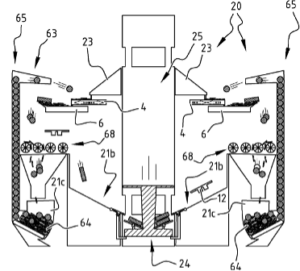The Elaut Group of Belgium has been known for the manufacture and design of quality cranes and pushers for several decades. In a move similar to the days when video game manufacturers faced what were called “knockoff kits,” Elaut has issued a formal statement reminding the trade that many of its machine features are covered by patents.

The company says it employs “a large team of experienced and trained engineers, designers and game enthusiasts to build the games of tomorrow. With research and development, comes trial, error, prototyping and regularly a great new design and technological improvement.”
The result is embedded in their portfolio of patents, trademarks and copyrights to safeguard that technology and that they are committed to protecting their intellectual property.
“Regularly, operators will be tempted by overseas websites to import games directly from Asian factories,” their statement says. “These types of games often don’t comply with local safety regulations, nor import regulations, so the importer takes a high risk and is responsible for all adverse consequences.
“The European Union has strict regulations around product safety, environmental protection, and health-related issues and the CE marking on a product is a symbol that marks that specific product to comply with these requirements. Importing non-CE compliant products into the European Union can lead to several serious consequences, both legally and financially (seizure of goods, fines and penalties, legal liability and more),” the statement continued.
“The same goes for other local requirements, such as UK CA and US safety regulations. Moreover, directly imported goods often infringe on other company’s intellectual property. This opens up the importer to the risk of legal and financial consequences. And so, we want to remind the industry of our closed-loop pusher games patents in the EU (3543973 and 3021298), USA (9754456) and GCC countries (201631302).
“We want to emphasize that any third party is prohibited from manufacturing, offering, marketing, using or importing these types of closed-loop pushers in the countries where our patents are validated,” they declare.
“Briefly, these patents comprise a closed-loop pusher system (single- or multiplayer) with several playing pieces and one or more prizes on the playfield. Both the playing pieces as the prices can be balls/marbles, coins, chips… and the shape and/or size of the playing pieces are different from the size and/or shape of the prices.
“Playing pieces and prices fall over the edge of the pusher, are collected and sorted into a collector location and are reintroduced on the playing surface. Different variations of the above descriptions are possible and can be found in our patent claims. The figure below is an example of one of the possible variants/claims.
“Elaut has agreements and collaborates (for field inspections) with several licensees to import, distribute and sell specific pushers in the previously mentioned markets. Any pusher that matches the previous description and that is brought into one of the previously mentioned markets (EU, USA and GCC), will be considered as a potential infringement of our intellectual property (IP),” said the statement. “Each licensee is requested to report their sales of the licensed games to Elaut on a quarterly basis. Moreover, from the beginning of 2023, Elaut has requested each new licensed game to be marked with a patent decal to facilitate field inspections.”
The statement declares that Elaut reserves all rights to protects its IP and its commitment towards its licensees, “and in particular the right to go to court in order to enforce necessary actions and compensations.”
On top of the pusher patents, the Elaut holds several other patents, trademarks, models and designs. For a complete overview, visit www.elaut.com/ip.
